Best bike multi-tools: Well-equipped bicycle tools, tested and reviewed
A toolbox in your pocket, the best bike multi-tools are a cyclist's staple and can solve a range of mechanical issues on the bike or at home
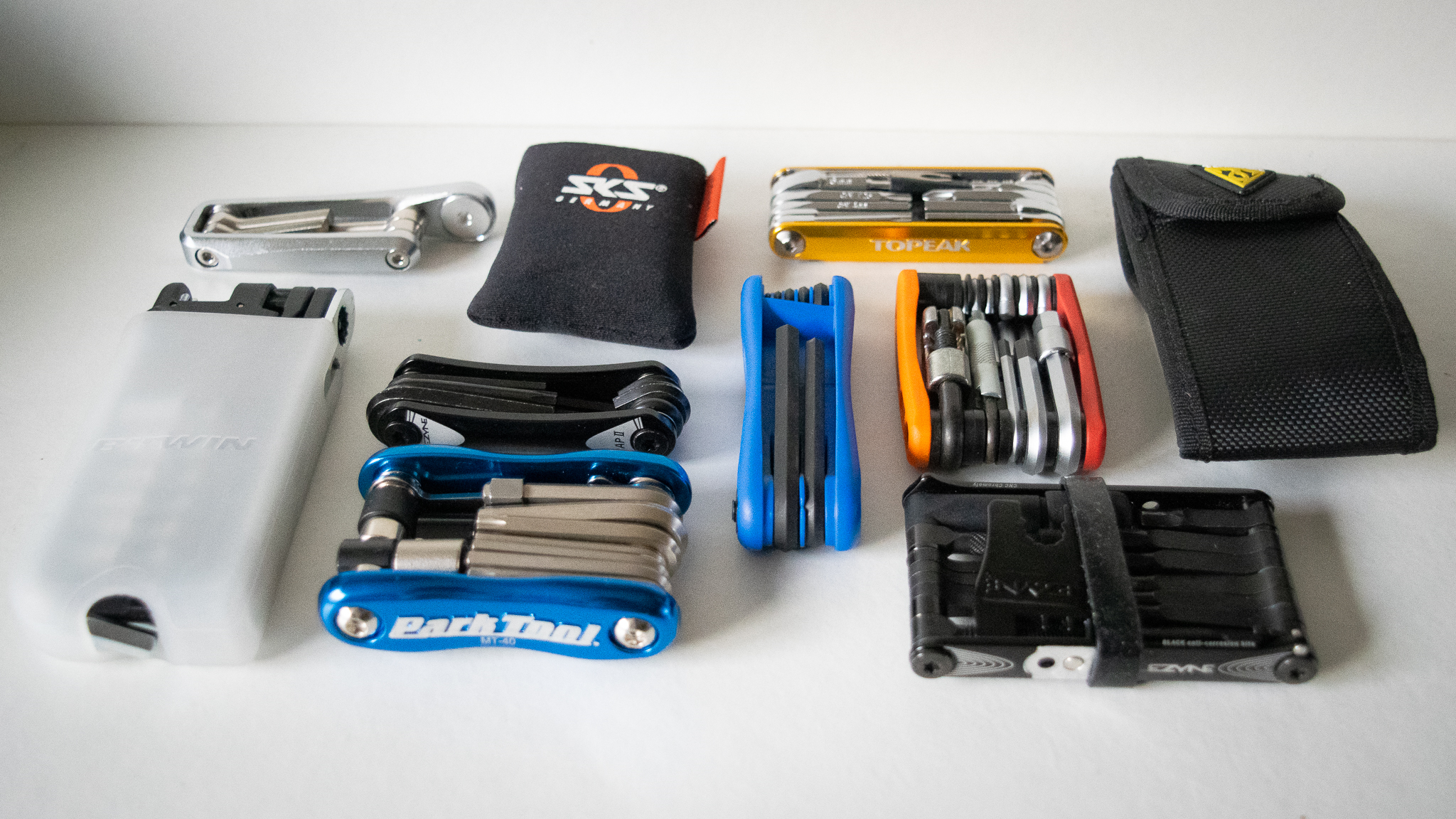
Carrying the best bike multi-tools with you when you are cycling is something that's really worth doing. A multi-tool will allow you to fix a range of potential mechanical issues that can occur whilst out riding as well as allow you to adjust your position and contact points should you need to.
You can choose from a simple, small multi-tool to larger more comprehensive tools that have a wide range of functions if you want to carry a bit more. Bigger tools can obviously do more, but there's a trade-off if you don't want to carry too much. There are also plenty of tools now with tubeless repair features and CO2 inflators built-in if this is a factor for you.
It's also adding here that a well-maintained bike that's in good order should rarely fall foul of a major mechanical out on the road. Take some time to do a monthly bolt check with a torque wrench and general inspection, and you'll find you rarely get into trouble on the road with a crank arm in one hand wondering how it fell off.
I'm a qualified mechanic and have tested and used all of the tools in this guide myself on a range of maintenance jobs. You can also find a lot more info about how to choose the right tool and what to carry at the bottom of the page.
Best bike multi-tools
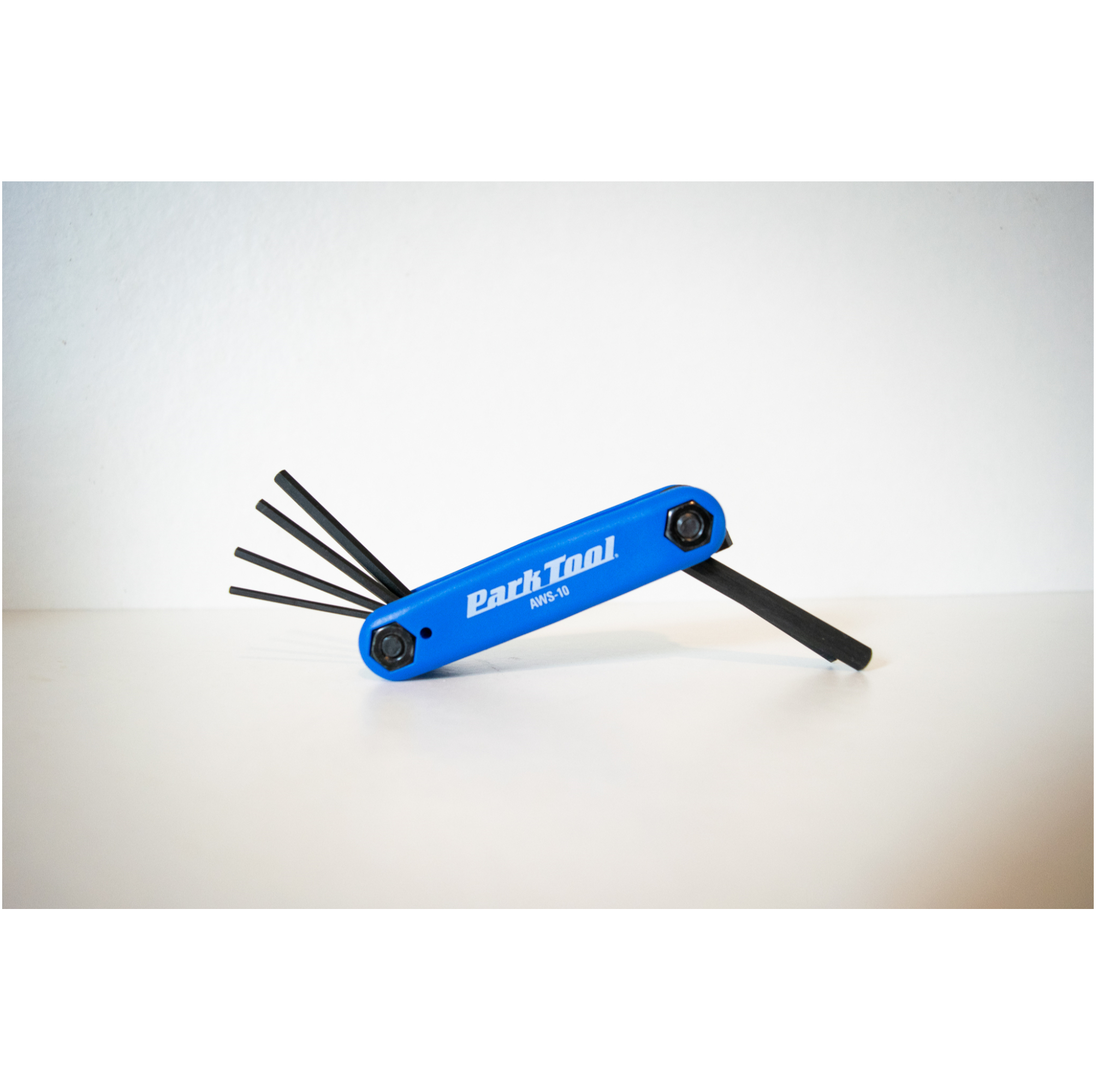
Best for reliability
➕ Simple and reliable
➕ Long body for plenty of leverage
➖ Only has a basic selection of hex keys
I think a Park Tool AWS-10 has been a feature of every workshop I've ever worked in. It's a bit of a staple. Its burly and simple design just makes it a really solid multi-tool to use. Its smooth plastic and rounded corners feel great in hand, and it will take a fair bit of abuse. It's a good one for the garage as well as out riding, though you may want to carry something with more capability with you. It's a hex key-only tool and they range from 1.5,2,2.5,3,4,5,6mm.
Weight: 106g
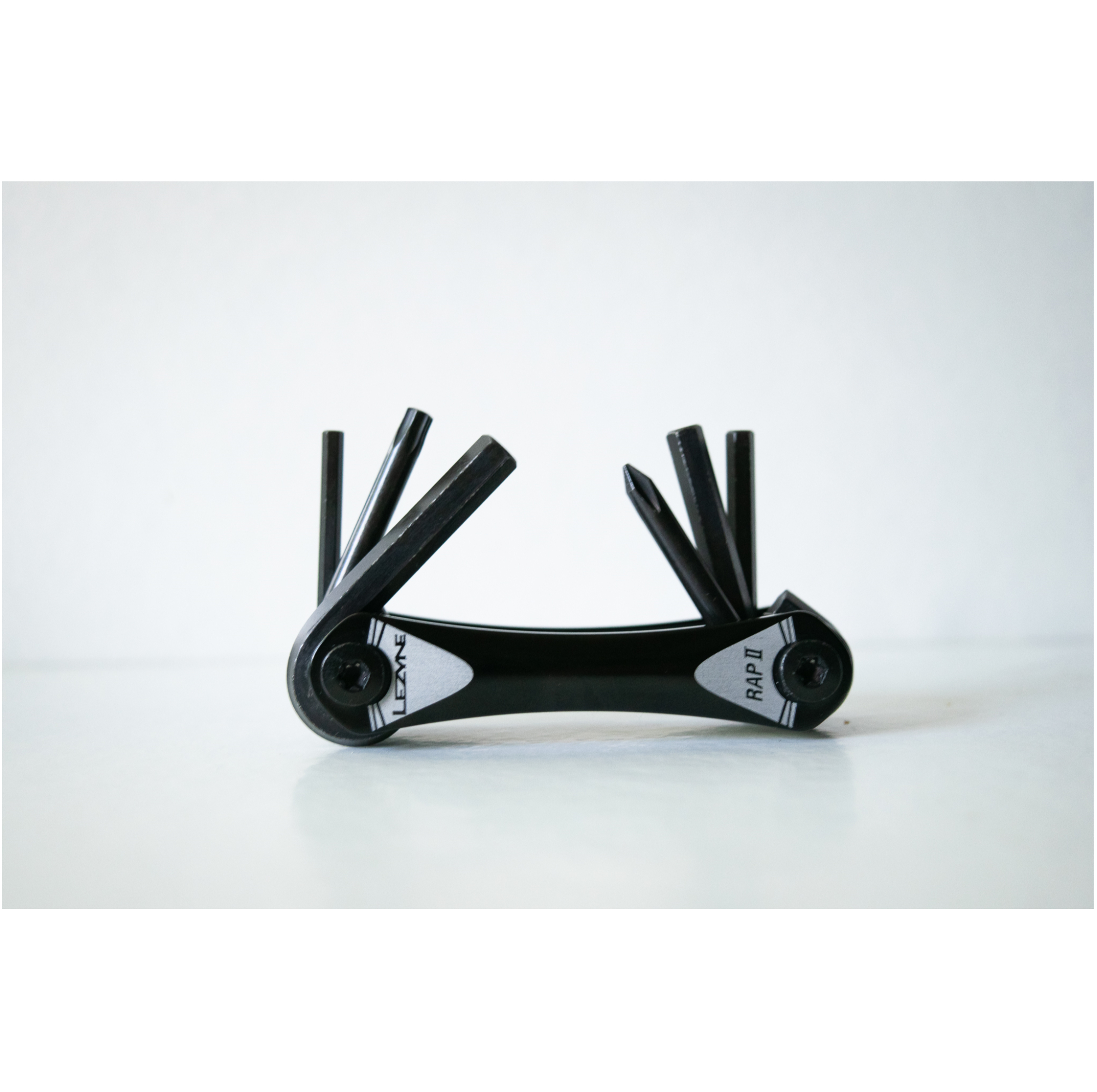
Best for simplicity
➕ Lightweight
➕ Compact size
➖ Minimal tool selection
If you want a simple, no-nonsense multi-tool then the Lezyne Rap II is it. It's the lightest tool in the test at 84 grams and features 3/4/5/6 hex keys a T25 and a Philips head. You could get a lot done with this tool. However, I do think the anti-corrosion coating may wear off in time.
Weight: 84g
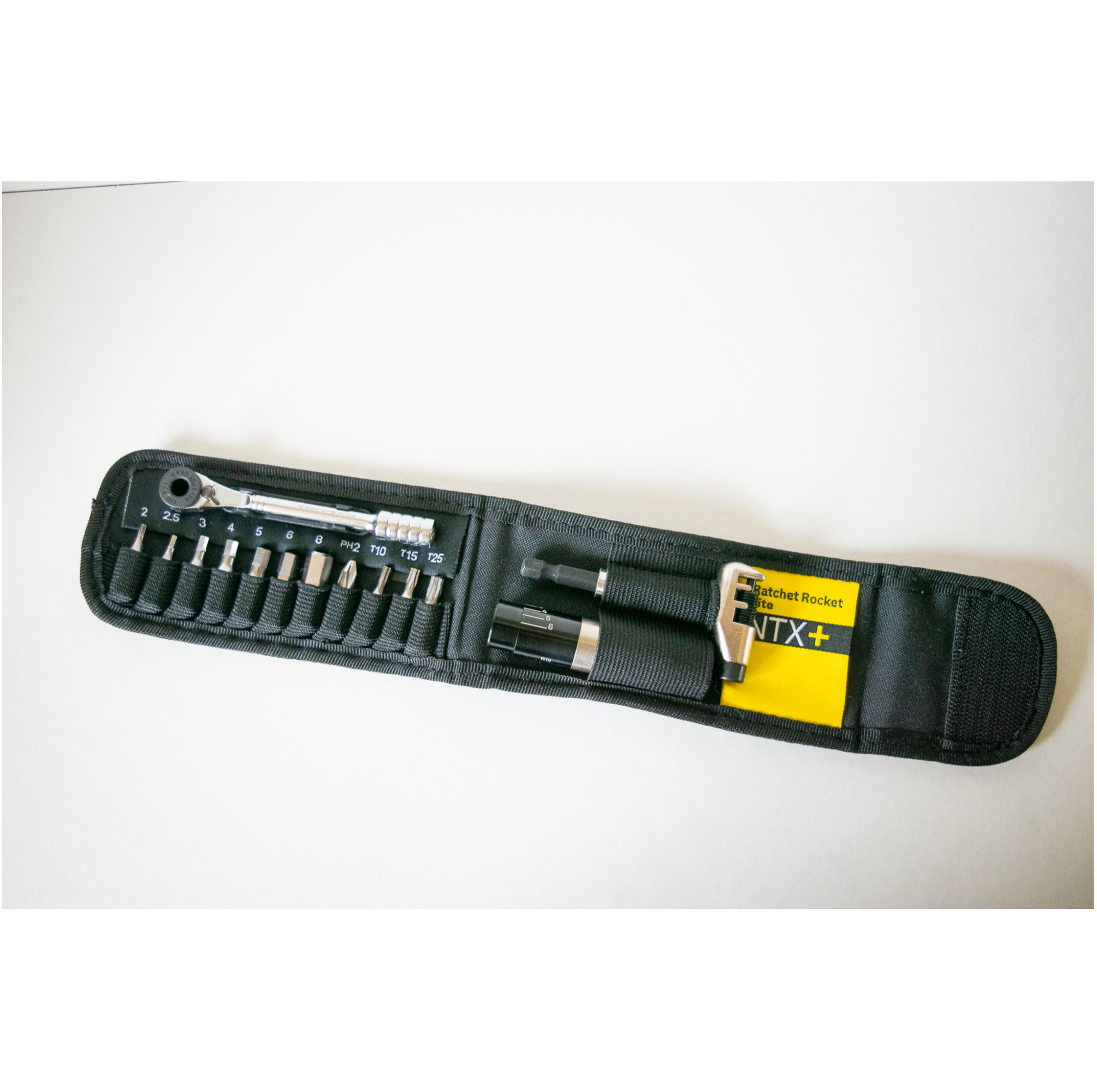
Best ratchet tool
➕ Ratchet convenience
➕ Wide selection of tools including a torque adapter
➕ Compact size
The Ratchet Rocket Lite NTX ticks a lot of boxes in one compact package. Inside the velcro case which will fit inside a jersey pocket is a mini ratchet and 11-piece 1/4" bit set. The bits run from 2-8mm, Philips, and torx. There's also a chain tool which is 12s compatible (not Campag though) and a pre-set torque adaptor covering 2-6Nm that's guaranteed for 5000 uses.
Weight: 236g
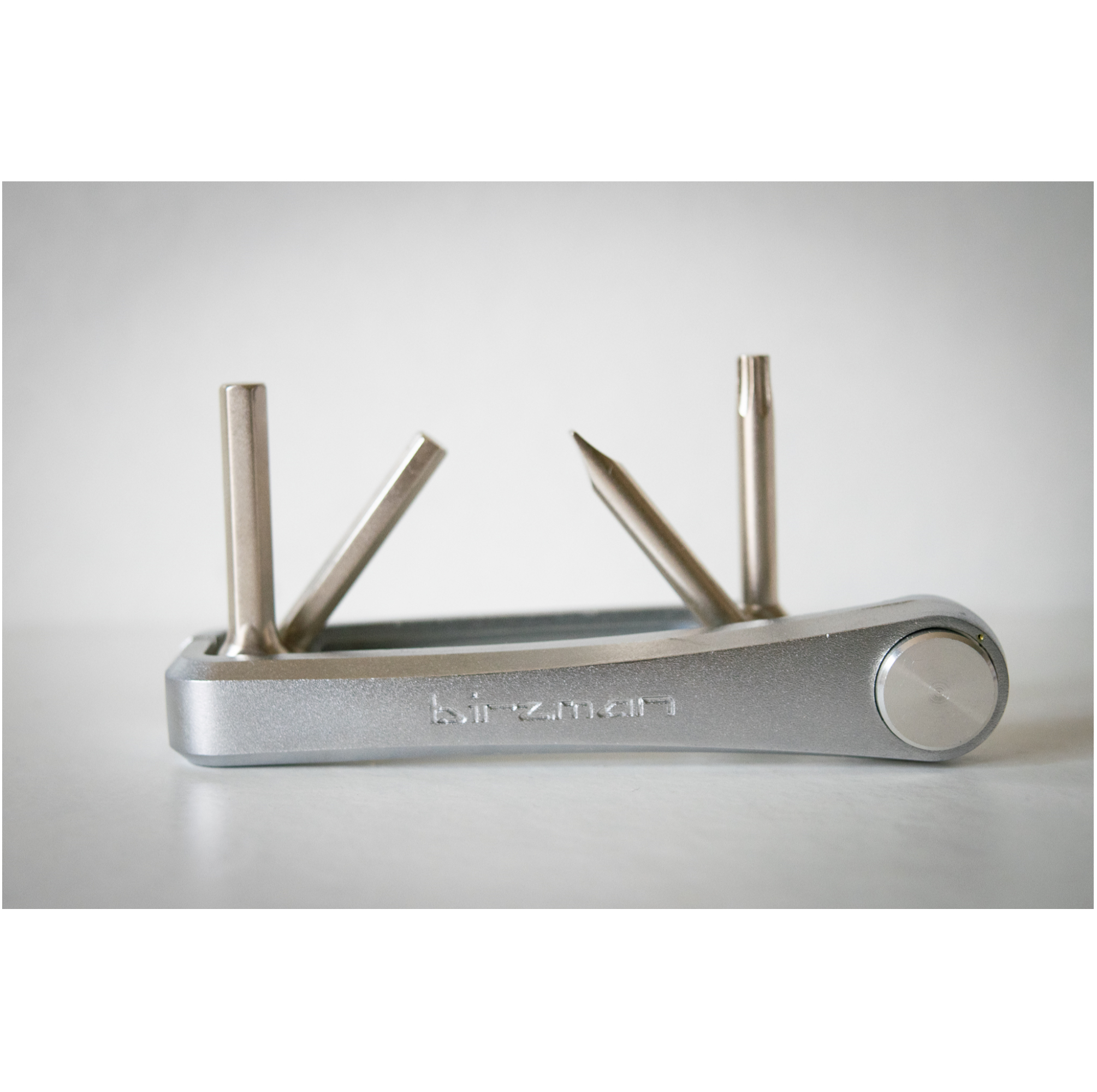
Best for easy torque
➕ Simple preset 5Nm torque setting
➕ Compact size
➖ Very minimal tool selection
If you only need or want to carry a small lightweight multi-tool without all the extra functions the Birzman M Torque 4 ticks that box. It's a light, stylish multi-tool that also has a pre-set torque feature. The 4 and 5mm Hex keys and T25 Torx have a pre-set 5Nm torque function meaning you can safely adjust key contact points with it at home or on the road.
Weight: 97g
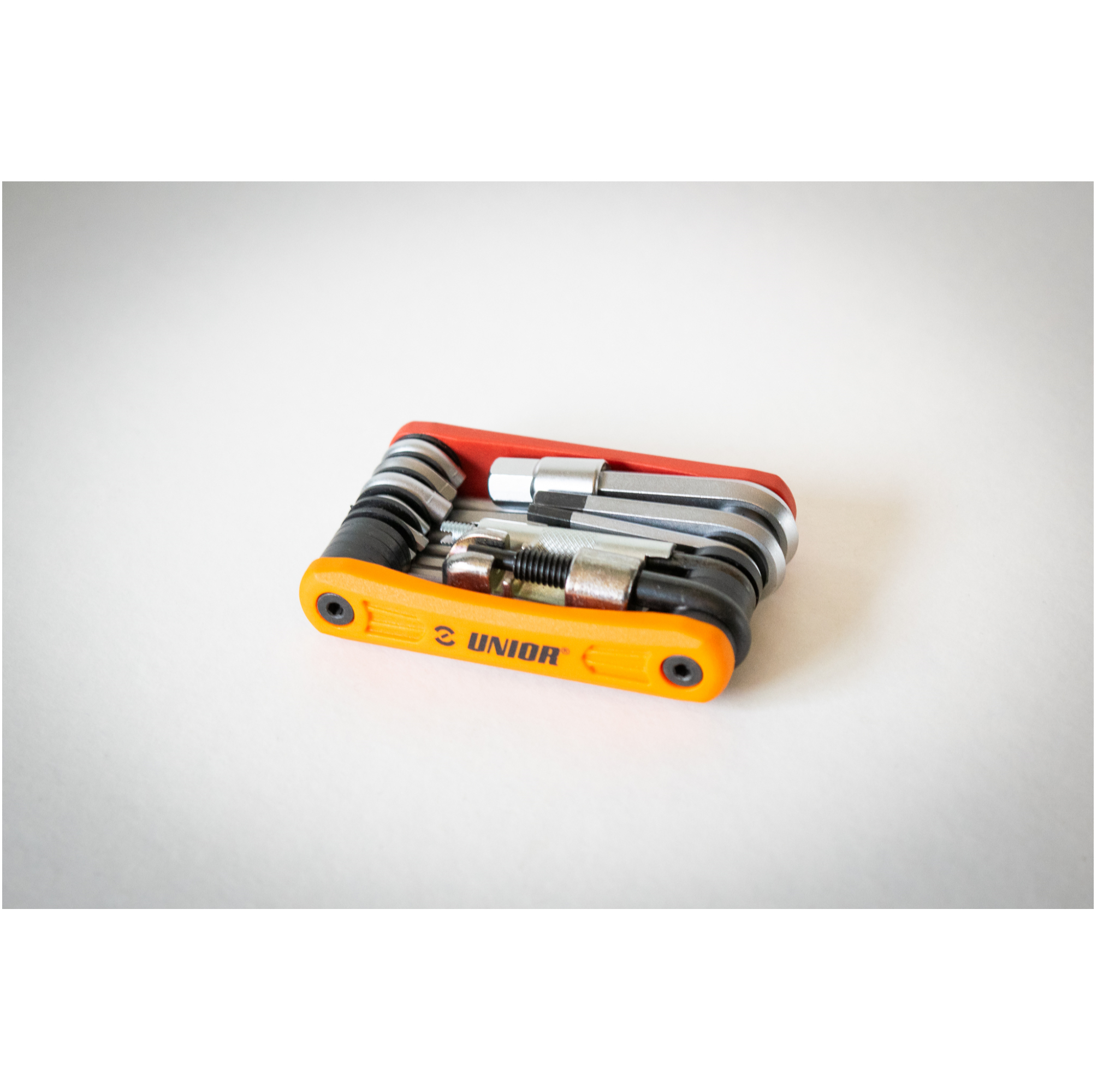
Best for durability
➕ High-quality black oxide-coated tools
➕ Good tool selection including chain tool and valve tools
➖ Expensive
The Unior EURO13 has you guessed it, 13 functions. Including a chain splitter and valve core remover tool alongside torx, hex and a Phillips screwdriver tool. There's an 8mm for pedal removal which is handy. The Euro 13 has a quality feel in hand, in part due to the comfortable plastic sides, and uses quality chrome-plated tool spindles with black oxide-coated tips which aid durability. The plastic spacers between each tool make for a super smooth action in use which I love.
Weight: 148g
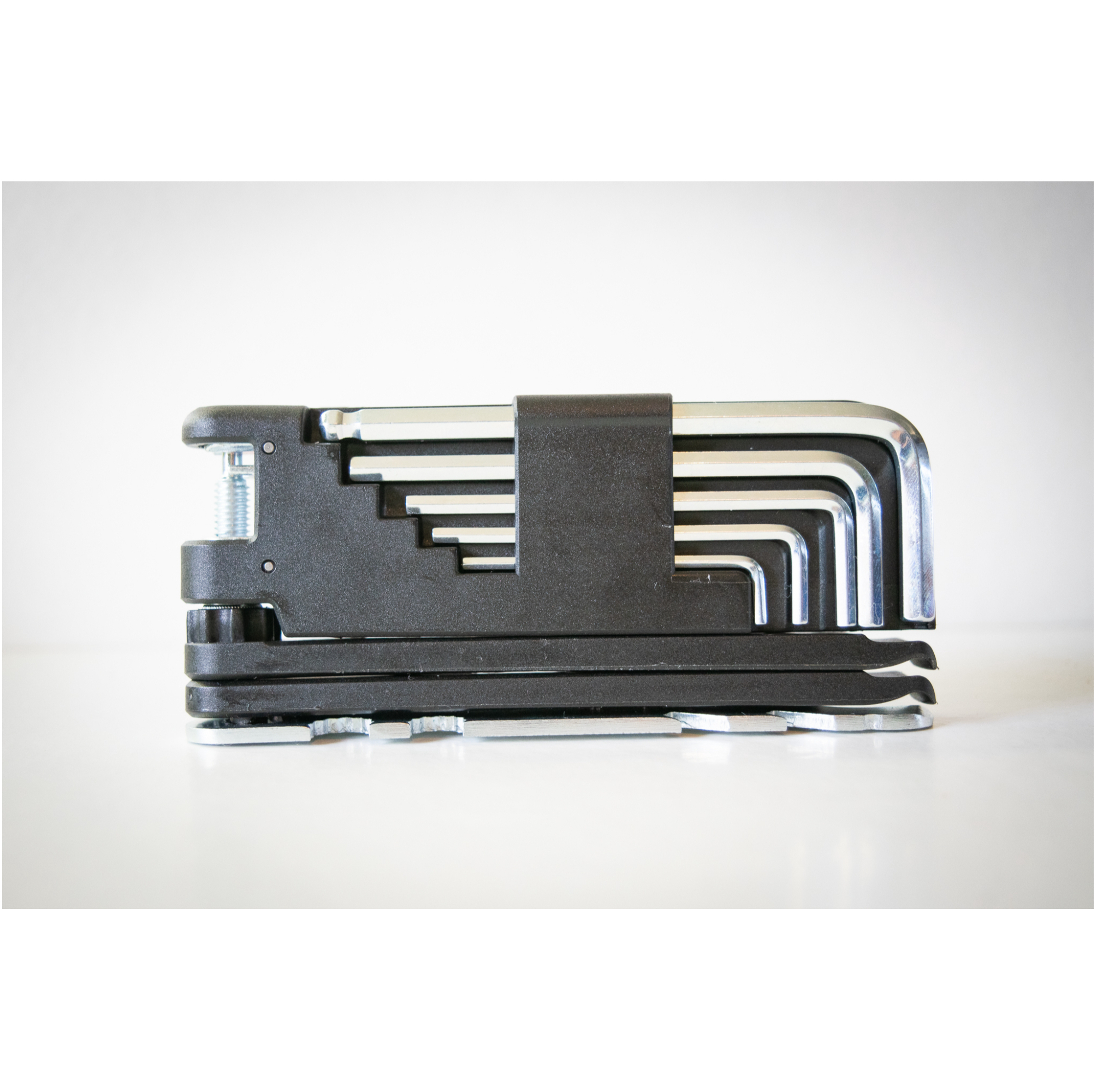
Best budget bike multi-tool
➕ Lots of tools at a budget pricepoint
➕ Hollowtech two-bearing preload cap tool
➖ Heavy
You get a lot for under £15 / $18 with the Decathlon 920 multi-tool, which comes in a soft silicone case. There's a range of proper hex keys, chain splitter tool, torz and screwdriver bits, bottle opener, and spoke keys. And perhaps the standout feature for me is a Hollowtech two-bearing preload cap tool built into one of the plastic tyre levers, a really useful feature.
Weight: 235g inc. case
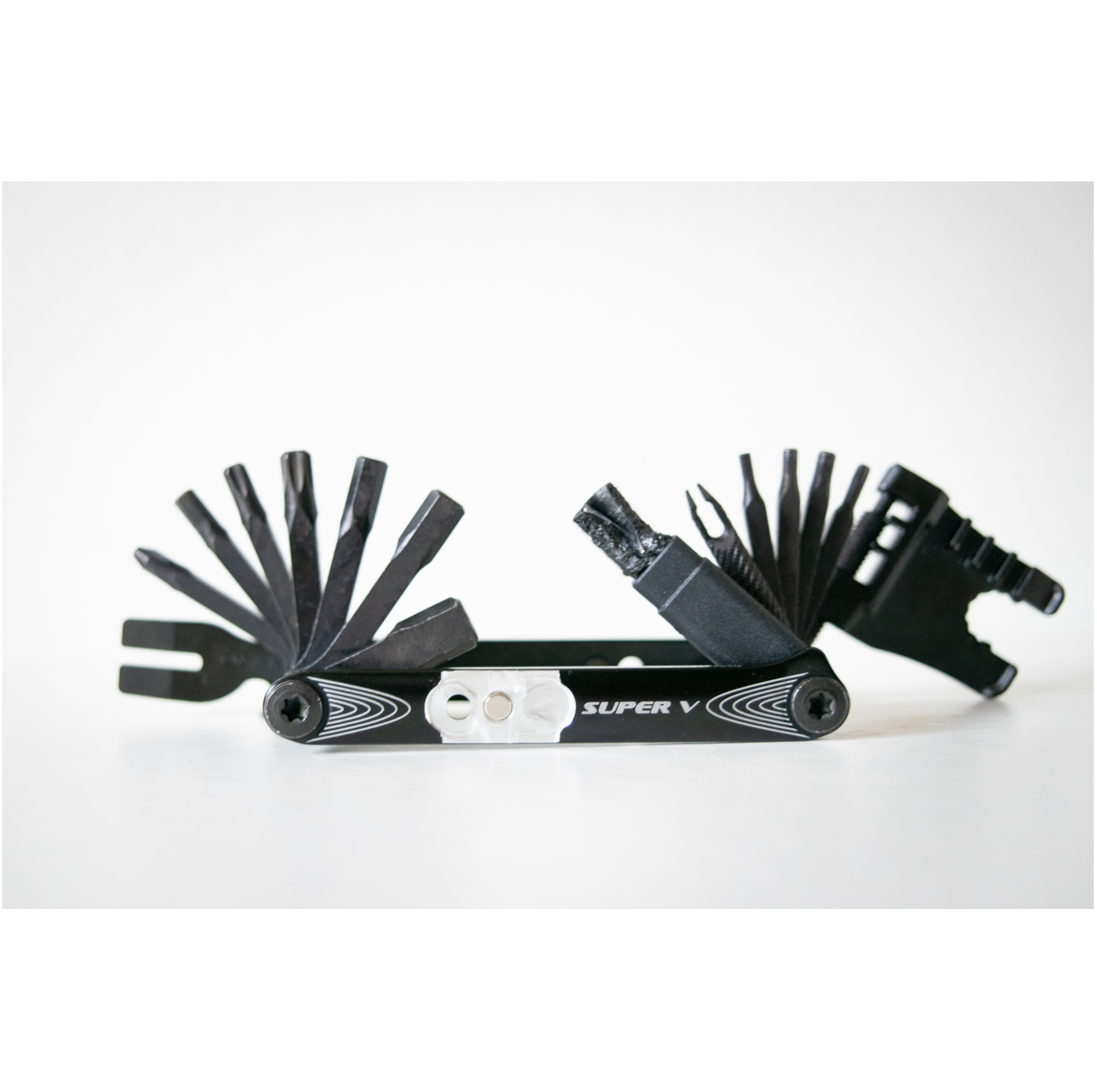
Best tool selection
➕ Huge selection of tools
➕ Not too heavy
➖ Anti-corrosion finish can wear off
The Lezyne Super V is compact and narrow so it should fit nicely in a saddle bag or jersey but can do a lot. There's a chain tool, disc calliper piston spreader, tubeless plug tool and plugs, valve core tool, spoke keys, usual hex and torx keys and space to store a quick link in the tool's body, like the Park MT40 there's also a bottle opener!
Weight: 154g
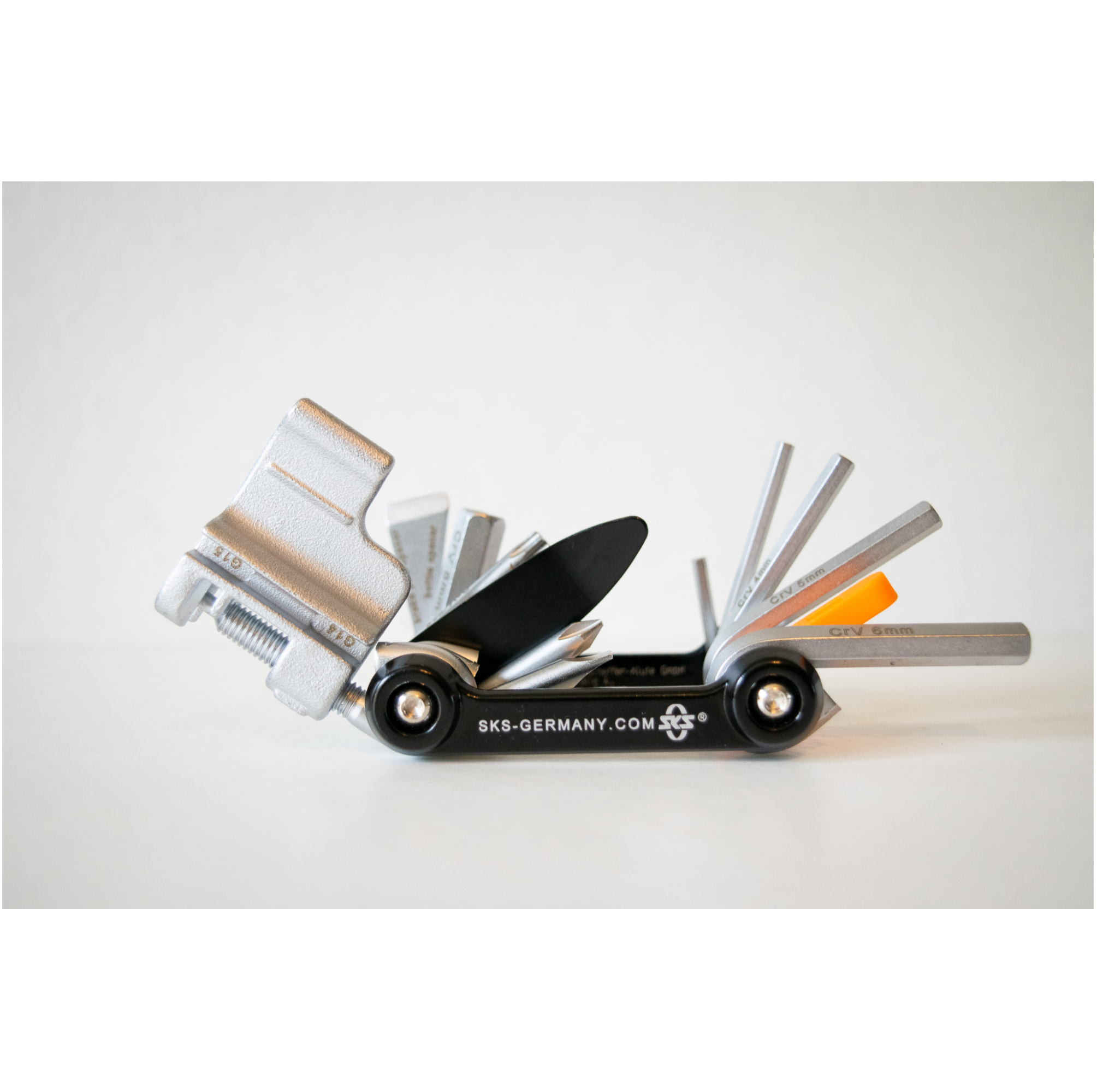
Runner up for tool selection
➕ Great tool selection
➕ High-quality finish
➖ No tubeless repair tools
➖ Metal tyre levers can damage rims
The SKS Tom 18 arrives in a neat neoprene pouch and uses chrome vanadium tool steel in its construction. There are Philips and flathead screwdrivers, hex keys a T25 Torx, two tyre levers, a chain tool and a disc pad spreader amongst others. If you don't need CO2 or plug features in your multi-tool this is a great all-rounder. There's even a holder for a spare chain pin!
Weight: 186g
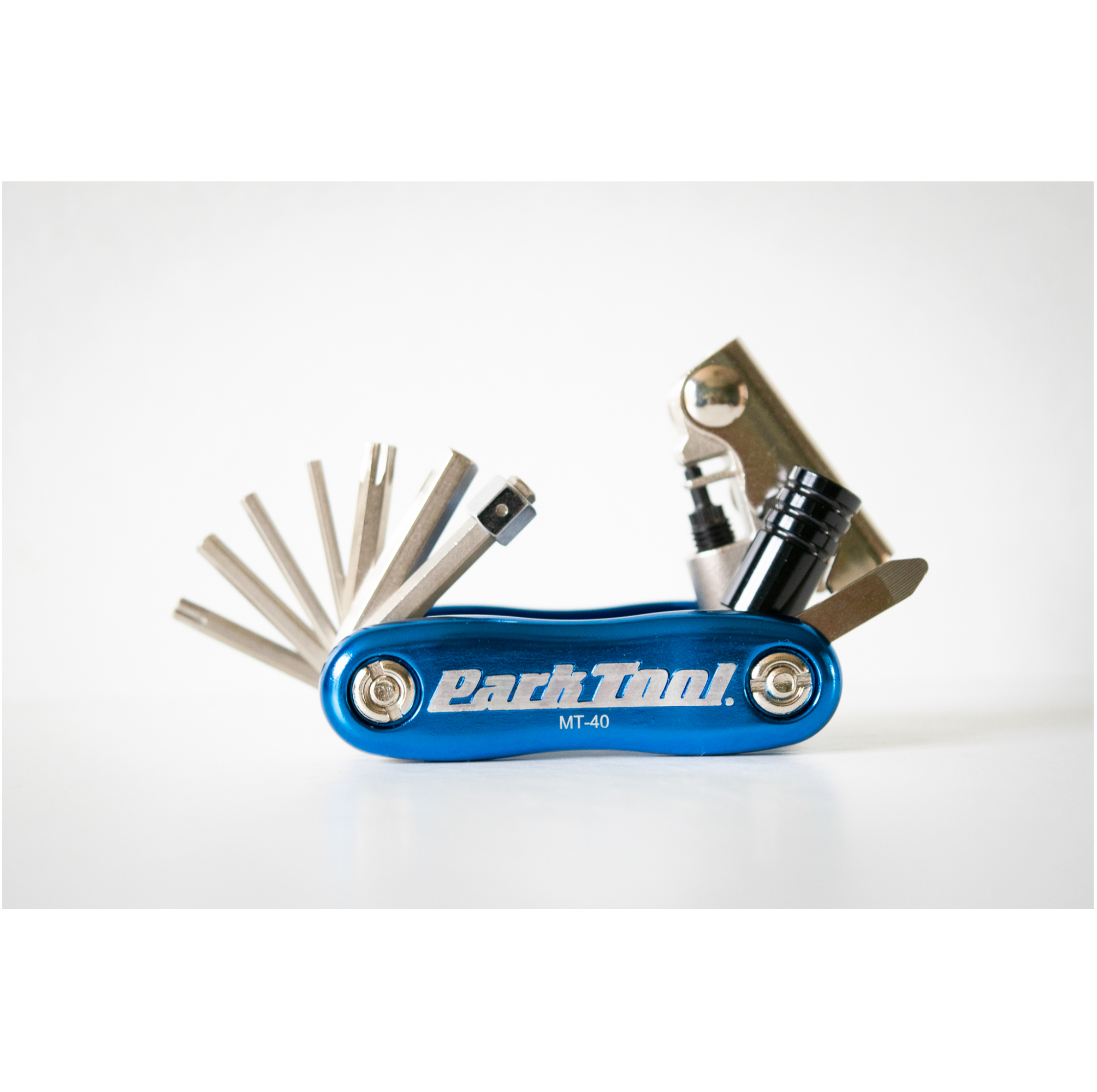
Best multi-tool with CO2 inflator
➕ CO2 inflator saves carrying an extra tool
➕ Park Tool reliability
➖ A little bulky
The Park Tool MT40 is a more comprehensive tool from the American brand that incorporates a CO2 inflator into the tool itself which is really useful if you ever caught short seating a tubeless tyre, though there's no plug tool included. There's a chain breaker tool and hex and torx keys. The MT40 is a bit bulkier than some other models here but will still comfortable in a jersey pocket or medium saddle bag
Weight: 240g
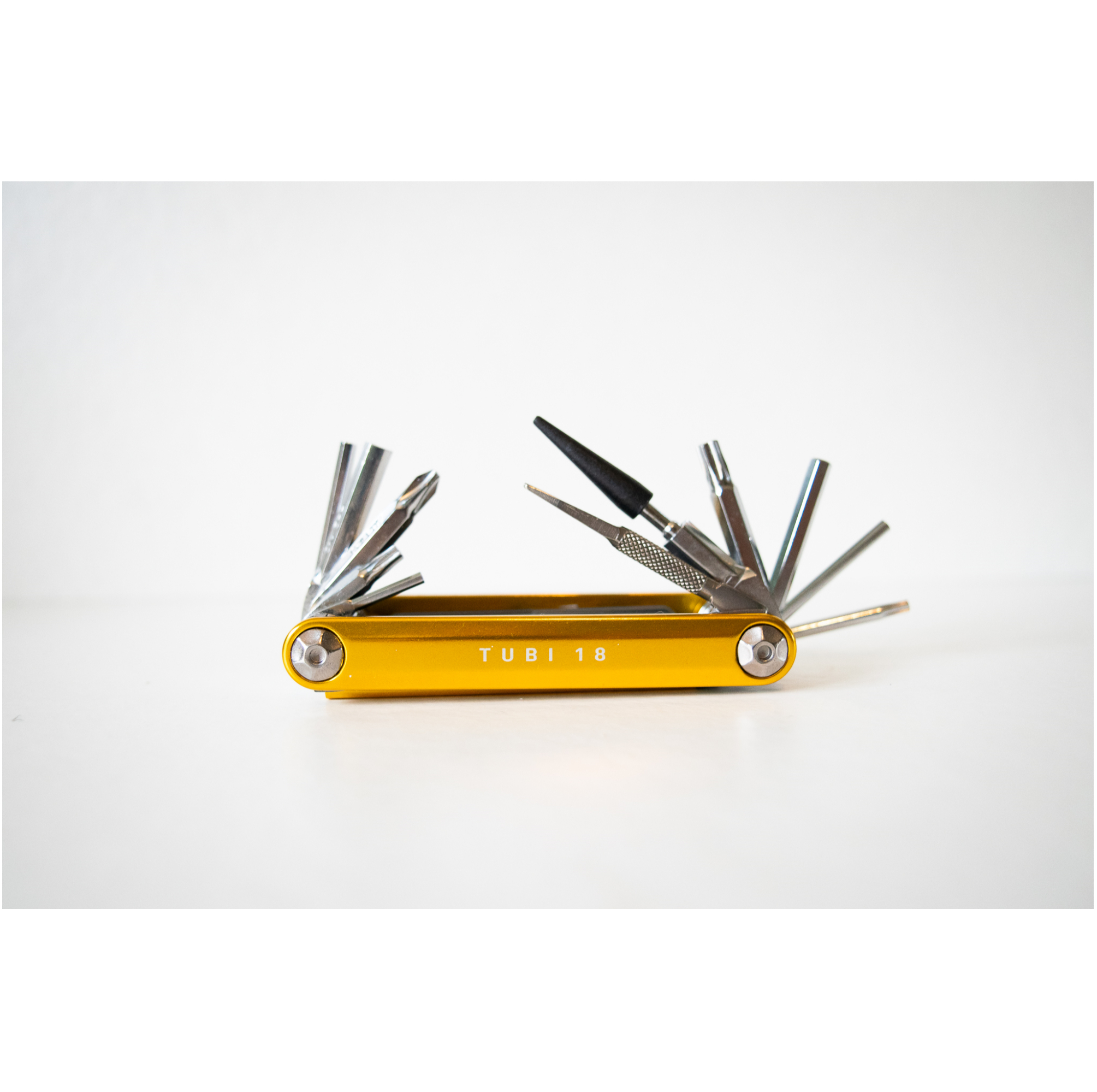
Best multi-tool with tubeless repair
➕ All tools required for tubeless repair
➕ Storage for spare tubeless plugs
➖ No chain-splitting tool
The Topeak Tubi 18 has a forged aluminium body and chrome vanadium steel tools. As well as Hex, Torx and Philips tools, it features a tubeless tyre plug insertion tool, reamer, three 3.5mm plugs and a sharp knife to trim them off that's useful for other jobs too. There's also a detachable air stop tool to prevent total tyre air loss whilst you're getting ready for a repair.
Weight: 118g
Last updated on 08th of May 2025
Updated the guide to a new easy-to-read format and checked all the products are still current and available.
How to choose
Do I need a bike multi tool?
In short, yes.
It's a really good idea to carry at least a basic tool that allows you to adjust your bike and tighten bolts down. Components can work loose and move due to vibrations from the road or even fail from time to time. If something prevents you from continuing a ride that could have been easily solved with a multi-tool or Allen key then it's probably worth carrying one. It could also help a fellow rider who is stranded or in trouble, especially in isolated areas.
What is a bike multi-tool?
A bike multi-tool is a compact and versatile tool designed specifically for carrying out emergency roadside repairs or quick on-the-fly adjustments during your ride. They’re always portable, small enough to carry in a pocket or saddle bag and combine various tools into a single unit, like a Swiss army knife or Leatherman tool.
Typically, a multi-tool will come with a range of Hex keys in different sizes, which are used for tightening and loosening bolts and screws. These make it possible to adjust your saddle height, or tighten a loose and rattling bottle cage or mudguard, for example. They also tend to feature Philips and flathead screwdrivers, as a minimum.
Other tools included vary from model to model, making some better suited to certain uses than others. Whether or not you want a multi-tool that comes with tubeless tyre repair parts, a chain breaker tool, or Torx wrenches, is totally up to you and your individual needs.
What should I look for in a multi too?
A good place to start is to make a list of the sizes and types of fasteners and bolt sizes on your bike/s. There are almost certainly going to be 2/4/5mm hex keys and perhaps 6/8mm for your disc thru-axles if you have them and pedals. These are the essentials to make basic adjustments and tweaks.
If you own more than one bike, see which sizes are most common and look for the tool that matches the majority.
Then depending on how much you want to spend and carry you could add more features like a chain tool - this is always useful. And things like spoke keys, valve core tools etc.
What tools should I carry on my bike?
No one wants to be loaded down with a full tool kit while riding, so cyclists often carry a multi-tool that fulfils most of the duties that are likely to be required. More often than not these are small adjustments to seat posts and the like, but also you want cover for worst-case scenarios.
While many cyclists will also carry a puncture repair kit of sorts, some of the best bike multi-tools come with elements to help with this, such as tyre levers or even tubeless tyre repair kits.
Regular home maintenance can help keep your bike running smoothly, and hopefully prevent some of the most common issues from happening in the first place. If there is a specific component you have been having trouble with, you could always bring out the particular tool you know will help you to adjust it. If for example you know you'll be adjusting your new cleats on a ride, take a full-size 4mm Allen key with you for the shakedown ride.
What do you need in a bike multi-tool?
The majority of your bike can be disassembled with a 4mm and 5mm Allen key so, at the very least, the best bike multi-tools should have Allen keys with these two sizes. It’s also worth having a 6mm. While some tools may have an 8mm or 10mm bit, quite often they aren't much use because the tool doesn’t offer enough leverage to break a bolt that size loose. An 8mm is a useful size though when travelling for installing pedals.
Some bikes also use Torx bolts, usually in a T25 and sometimes a T30, and a small Phillips head screwdriver also comes in handy for derailleurs.
The other tool we prioritise on a bike multi-tool is a chain splitter. Even if you have a quick link in your spare tyre kit, you’ll need a chain tool to pop the old link off. Quite often the chain tool will also have spoke wrenches built into the lever.
And along with the rise of tubeless tyres comes the need for new tools. A valve core remover isn't something many will need to use at the roadside, but if you don't have one at home (or if you lost it again), then it's good to know there's one built into your multi-tool.
Multi-tools also now include tubeless repair tools and if you ride with a tubeless setup on most of your bikes it's a good idea to get a tool with tubeless plugs, an insert tool or a CO2 inflator.
Can I use a regular tool or leatherman style tool?
Yes, of course, plenty of cyclists have been carrying the same multi-tool for many years in their saddle bag or pocket. You can use whatever works for you. I still have an old multi-tool I was given years ago that's small and fits the bolts on my bikes, it even has crash damage from sliding on the road.
If you prefer a Leatherman-style tool or anything for that matter, use what works for you.
Which extras should I look for?
Some more extensive bike multi-tools have extras such as tyre levers, torque wrenches and bottle-openers. While a torque wrench can be useful out on the road, primarily if you're dealing with carbon components, the rest is a matter of personal opinion – do you think it's worth carrying the extra grams?
Ultimately, tyre levers only weigh a few grams, and even an expensive set doesn't cost all that much or take up much space in your pocket. When it comes to multi-tools with fun additions such as knives, pliers and bottle openers, they might be used once in a blue moon but are they really going to be useful for your Sunday club ride? Once again, it all comes back to considering your own specific needs.
The latest race content, interviews, features, reviews and expert buying guides, direct to your inbox!

Tom joined the Cyclingnews team in late 2022 as a tech writer. Despite having a degree in English Literature he has spent his entire working life in the cycling industry in one form or another. He has over 10 years of experience as a qualified mechanic, with the last five years before joining Cyclingnews being spent running an independent workshop. This means he is just as happy tinkering away in the garage as he is out on the road bike, and he isn’t afraid to pull a bike apart or get hands-on with it when testing to really see what it’s made of.
He has ridden and raced bikes from an early age up to a national level on the road and track, and has ridden and competed in most disciplines. He has a keen eye for pro-team tech and enjoys spotting new or interesting components in the wild. During his time at Cyclingnews, Tom has already interviewed some of the sport's biggest names including Mathieu van der Poel, Tadej Pogačar and Alberto Contador. He's also covered various launches from brands such as Pinarello, Ridley, Specialized and more, tackled the Roubaix Challenge sportive aboard his own rim-brake Cannondale SuperSix Evo, tested over 20 aero helmets in the wind tunnel, and has created helpful in-depth buying advice relating to countless categories from torque wrenches to winter clothing.